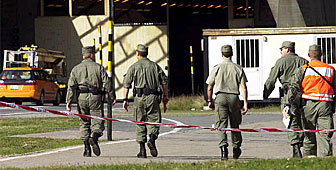Army removes explosives from Gotthard tunnel depot

Authorities are removing an explosives depot near the southern entrance of the Gotthard tunnel, Switzerland's main transalpine road axis, following last week's blaze in the tunnel.
The Defence Ministry said the explosives, which have been kept at the Gotthard as part of Switzerland’s traditional security system, would be removed.
The ministry said the move was in line with an overhaul of Switzerland’s defence strategy underway since the end of the Cold War era.
About 1,000 of Switzerland’s key tunnels and bridges are protected by a system of underground bunkers and explosives as part of a defence strategy dating back to Second World War.
“The idea at the time was to protect the strategically important transalpine routes through Switzerland,” Felix Endrich, a defence ministry spokesman told swissinfo. “It was considered a last resort to blow the tunnels or bridges up if the enemy invades the country.”
Endrich stressed the safety precautions taken for the storage: “The explosives are locked up and cemented into solid rock or at the pillar of a bridge, and the explosive material, TNT, is always kept separate from the fuses,” he added. Some sites are only mined in times of war.
No danger during tunnel fire
The spokesman also said there was no danger the explosives in the Gotthard could have caught fire accidentally during last week’s blaze, as the material is stored a fair distance away from the actual tunnel.
He also pointed out that TNT would not even explode at extremely high temperatures, which was the case during the tunnel fire. “It does not blow up, it just burns,” Endrich said.
The Defence Ministry said the security strategy has been undergoing changes since the collapse of communist regimes, which authorities considered a real threat to neutral Switzerland during the Cold War era.
Endrich, however, said the authorities realised the need to adapt the traditional defence policy to the new global situation following the fall of the Berlin Wall. “Within a new concept we are about to take the explosives away from the more than 1,000 strategic sites,” Endrich said.
Safety checks
Meanwhile, forensic experts are awaiting the all-clear from safety checks before searching burned-out vehicles in the Gotthard tunnel for any more victims of last Wednesday’s disaster.
Eleven people were killed after two trucks collided near the southern entrance to the tunnel, sparking an inferno, which took days to bring under control.
But authorities are increasingly convinced that the final toll from the crash in the 17 kilometre tunnel will not surpass by much the 11 already confirmed dead.
Search crews trained to find the remains of disaster victims had planned to enter the blocked transit artery on Monday but delayed the operation until they could be sure they faced no chemical or toxic waste hazards, police said.
“We have to wait until the results of the chemical tests are in and we have approval from the experts and cantonal physician,” a police spokesman said. He added that that could take up to five days.
The Gotthard, the world’s second-longest road tunnel, was expected to remain closed for months, cutting a major link between Italy and northern Europe used by an average of 19,000 vehicles a day.
Repair work will only begin in mid-November once the police investigation is complete and all wreckage has been removed.
swissinfo

In compliance with the JTI standards
More: SWI swissinfo.ch certified by the Journalism Trust Initiative
You can find an overview of ongoing debates with our journalists here. Please join us!
If you want to start a conversation about a topic raised in this article or want to report factual errors, email us at english@swissinfo.ch.